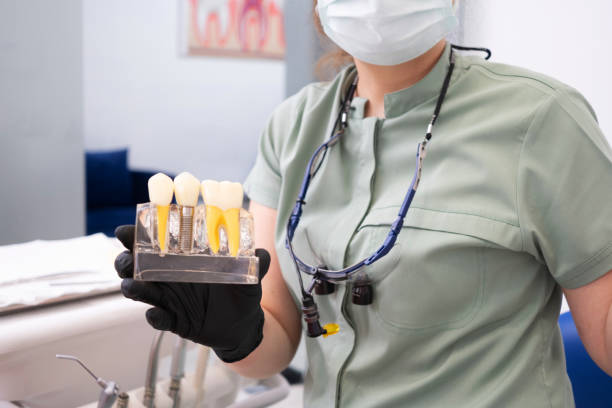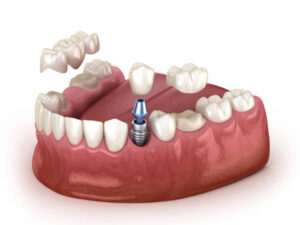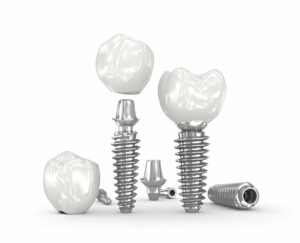Teeth implants are a popular solution for replacing missing teeth. They look natural, last long, and function like real teeth. However, many people worry about the pain involved in getting implants. So, does it hurt to get Teeth implants? Let’s explore this question and explain what you can expect during the procedure.
What’s the Procedure Like?
Understanding the implant process can help you feel more prepared and less anxious.
- Initial Consultation: Your dentist will examine your mouth and take X-rays. This helps them plan the implant placement. They will discuss the procedure and answer any questions you may have.
- Preparation: If your jawbone is weak, you might need a bone graft. This adds bone to your jaw to support the implant. Healing from a bone graft can take several months.
- Implant Placement: The dentist places the implant in your jawbone. This small titanium post acts like a tooth root. The procedure is done under local anaesthesia, so you should not feel pain.
- Healing Period: After the implant is placed, your jawbone needs time to heal. This process, called osseointegration, usually takes a few months. The implant fuses with your bone, creating a strong foundation for the artificial tooth.
- Abutment Placement: Once the implant has fused with your jawbone, the dentist will attach an abutment. This connects the implant to the artificial tooth. The dentist may need to make a small incision in your gum to expose the implant.
- Crown Placement: The final step is placing the crown. This is the artificial tooth that sits on top of the abutment. It is custom-made to match your natural teeth in colour and shape.
Does the Procedure Hurt?
Many people worry about pain during the implant procedure. However, local anaesthesia ensures that you should not feel pain during the surgery. Here’s what to expect:
- During the Procedure: The dentist will numb the area with local anaesthesia. You might feel pressure, but not pain. Some patients also choose sedation to help them relax.
- After the Procedure: It is normal to experience some discomfort after the surgery. This can include swelling, bruising, and minor bleeding. Pain can usually be managed with over-the-counter pain relievers like ibuprofen.
- Healing Phase: During osseointegration, you might feel mild discomfort. This is typically less intense than the pain experienced right after the surgery.
Managing Pain and Discomfort
There are several ways to manage pain and discomfort after getting a dental implant:
- Medication: Your dentist may prescribe pain relievers or antibiotics to prevent infection. Follow their instructions carefully.
- Cold Compress: Applying a cold compress to the outside of your cheek can help reduce swelling and numb the area.
- Rest: Take it easy for a few days after the surgery. Avoid strenuous activities that might increase blood flow to your mouth.
- Soft Foods: Stick to soft foods like soups, mashed potatoes, and yoghurt. Avoid hot, spicy, or crunchy foods that could irritate the surgical site.
- Oral Hygiene: Keep your mouth clean to prevent infection. Your dentist will give you specific instructions on how to brush and rinse your mouth after the procedure.
Long-Term Comfort and Benefits
Once the healing process is complete, dental implants should feel like natural teeth. They are designed to be comfortable and functional. Here are some benefits of dental implants:
- Natural Appearance: Implants look and feel like natural teeth. They are custom-made to match your other teeth.
- Durability: With proper care, dental implants can last for many years. They are a long-term solution for missing teeth.
- Improved Oral Health: Dental implants do not affect adjacent teeth. They also help maintain the structure of your jawbone, preventing bone loss.
- Enhanced Comfort: Implants eliminate the discomfort of removable dentures. They become a permanent part of your mouth.
Tips for Reducing Discomfort at Home
Managing discomfort at home is crucial for a smooth recovery. Here are some tips:
- Apply an Ice Pack: Use an ice pack on the outside of your cheek to help reduce swelling and numb the pain.
- Gargle with Salt Water: Gently gargle with warm salt water. This may sting slightly but will help fight off any infectious bacteria.
- Rest: Ensure your whole body gets plenty of rest. Avoid heavy lifting and strenuous exercise.
- Cold, Soft Foods: Enjoy cold, soft, or pureed foods like smoothies or yoghurt. This helps soothe the area and makes eating more comfortable.
- Follow Dentist’s Advice: Adhere to your dentist’s instructions for oral care and medication. This will help ensure a quick and comfortable recovery.
Final Thoughts
So, does it hurt to get teeth implants? The answer is, not as much as you might think. The procedure involves some discomfort, but modern techniques and anaesthesia make it manageable. With proper care and pain management, dental implants have many benefits. They far outweigh the temporary discomfort. If you are considering dental implants, talk to your dentist about your concerns. They can provide more detailed information and help you make an informed decision.
Ready for a Comfortable Dental Implant Experience?
If you are considering dental implants and want a comfortable, professional experience, visit the Aberdeen Dental Implant Clinic. Our expert team is dedicated to providing the best care with minimal discomfort. Schedule your consultation today to start your journey towards a beautiful, natural smile. Contact us now to book your appointment and learn more about how dental implants can transform your oral health.
Frequently Asked Question
How long does the dental implant procedure take?
The implant procedure typically takes about 1 to 2 hours per implant. This includes preparation, placement, and immediate aftercare.
Can I eat after getting a dental implant?
Yes, but stick to soft foods like soup and yoghurt for the first few days to avoid irritation.
What if I feel severe pain after the procedure?
If severe pain persists beyond 10 days, contact your dentist immediately. It could be a sign of infection or complications.
How do I care for my dental implant?
Maintain good oral hygiene by brushing and flossing regularly. Follow your dentist’s specific aftercare instructions to prevent infection.
Are dental implants permanent?
With proper care, dental implants can last many years, often a lifetime. Regular check-ups with your dentist are essential.





